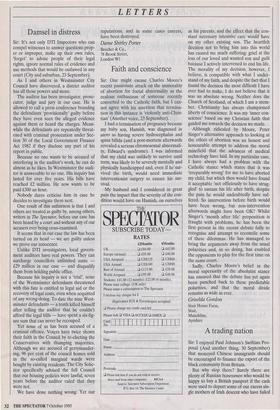Faith and conscience
Sir: One might excuse Charles Moore's recent passionate attack on the immorality of abortion for foetal abnormality as the zealous enthusiasm of someone recently converted to the Catholic faith, but I can- not agree with his assertion that termina- tion in this instance is 'violently anti-Chris- tian' (Another voice, 23 September).
I had a termination of pregnancy because my baby son, Hamish, was diagnosed in utero as having severe hydrocephalus and spina bifida (and a post-mortem afterwards revealed a serious chromosomal abnormali- ty, Edward's syndrome). I was informed that my child was unlikely to survive until term, was likely to be severely mentally and physically handicapped and, even if her sur- vived the birth, would need immediate interventionist surgery to ensure his sur- vival.
My husband and I considered in great pain the impact that the severity of the con- dition would have on Hamish, on ourselves as his parents, and the effect that the con- stant necessary intensive care would have on my other existing son. The heartfelt decision not to bring him into this world has caused me much suffering: grief at the loss of our loved and wanted son and guilt because I actively intervened to end his life. The morality of my decision, however, I believe, is compatible with what I under- stand of my faith, and despite the fact that I found the decision the most difficult I have ever had to make, I do not believe that it was an absolute wrong. Neither does the Church of Scotland, of which I am a mem- ber. Christianity has always championed liberty of conscience. It was my 'inner con- science' based on my Christian faith that guided me towards the decision we made.
Although ridiculed by Moore, Peter Singer's alternative approach to looking at the ethics of abortion was an honest and honourable attempt to address the moral minefield that the advances of medical technology have laid. In my particular case, I have always had a problem with the Catholic stance which states that it was 'irreparably wrong' for me to have aborted my child, but which then would have found it acceptable 'not officiously to have strug- gled' to sustain his life after birth, despite the pain he would undoubtedly have suf- fered. So intervention before birth would have been wrong, but non-intervention afterwards might have been OK? Whilst Singer's 'month after life' proposition is fraught with problems, he has been the first person in the recent debate fully to recognise and attempt to reconcile some of these dilemmas. He has managed to bring the arguments away from the usual polarities and, in so doing, has enabled the opponents to play for the first time on the same court.
Sadly, Charles Moore's belief in the moral superiority of the absolutist stance has ensured that the debate has yet again been punched back to these predictable polarities, and that the moral divide remains as wide as ever.
Griselda Gordon Stair House Farm,
Stair, Mauchline, Ayrshire










































































 Previous page
Previous page